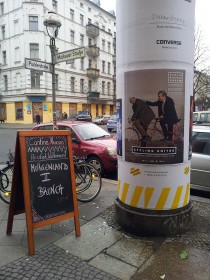
Postcard “Kol Nidre outside Metz 1870,” gift of Liselotte Eschenbach, more information on the object in our German-language online collection
© Jewish Museum Berlin, photo: Jens Ziehe
On 23 September of this year, we will celebrate Yom Kippur. As always on the eve of the Day of Atonement, synagogues will be overflowing with people anxiously waiting for the singing of Kol Nidre, a prayer (in form of a declaration) in Aramaic and Hebrew that implores God to forget “all vows, obligations, oaths or anathemas, pledges of all names, which we have vowed, sworn, devoted, or bound ourselves to,” either from the past year or for the year to come. This somewhat surprising imploration has caused many prominent Jewish thinkers to question the prayer’s validity. → continue reading
Pessach is approaching – the festival of exodus and freedom. This year, there is less talk of having the festive meal at large community gatherings. It is obvious, although unspoken, that smaller gatherings in the home make more sense. We are becoming alienated from our community centers through fear. Keep a low profile. Don’t speak Hebrew on the streets. Some people are removing the mezuzah from their front doorposts, a traditional object that visibly identifies a Jewish household. There is a mood of caution and nervous apprehension.
How did it get to this point?

Advertisement with Imam Ferid Heider and Rabbi Daniel Alter for the “Cycling Unites”-Critical-Mass-Tour in Berlin on 22 March 2015, photo: Michal Friedlander
June, 2014
A drunken man rolls slowly off the train platform and plops onto the tracks at Friedrichstrasse station. Around sixty people witness the moment and look away, hoping that someone else will solve the stinky, awkward problem. And so it was. An Italian and an Israeli jumped down to haul the semi-conscious man to safety. The passengers walked around the startled little group, pressing forward to make the oncoming train.
July 2014
Dinner party small talk. The discussions nearest me are taking a more political turn and I am just not in the mood to talk about Israel. Too late. The young man next to me asks if I saw the recent pro-Palestinian demonstration on the Kurfürstendamm? He becomes very still and lowers his voice. → continue reading
Purim is a family celebration, a time when children dress up, make a great din with rattles and gorge themselves on traditional Haman sweetmeats. By so much merriment it seems a little astonishing to recall that this religious holiday is actually rooted in a Bible story that is anything but happy and G-rated.

King Ahasuerus falls in love with Esther © photo: Shlomit Tulgan
The Book of Esther, which is read on Purim, tells of how the orphan girl Esther carries out a spectacular operation to rescue the Jewish people from the hands of King Ahasuerus, ruler of the Kingdom of Persia. The anonymous author recounts this story in the style of an epic poem and thereby suggests that God plays only a minor role in the proceedings. He turns the spotlight instead on the cunning with which clever Esther and her Uncle Mordechai manage to stop vizier Haman from realizing the pogrom he has planned against the Persian Jews. → continue reading


